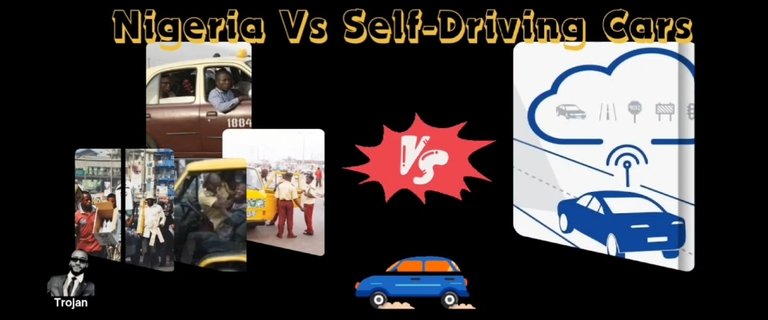Self-driving cars/vehicles that use AI and advanced sensors to navigate roads without human assistance are the future of transport technology. They promise convenience, efficiency, and, maybe, improved road safety. However, if I had the chance to buy a self-driving car today, especially in my country Nigeria, would I? And, in the event of an accident, who would be at fault? The owner or the company that promotes the car as "smart"?
Well, that is what we are going to find out in this post. Hope I make it worth your time.

The idea of owning a self-driving car is good to the ear, no doubt. just imagine sitting back in traffic (especially in Lagos) and letting the car do the work while you read emails, take a nap, or even catch up on the latest Netflix show. For many, especially in cities where the road takes up hours of their day, this seems like a dream come true. You’re transforming the time wasted in traffic into something productive.
Furthermore, self-driving cars are designed to minimize human error, which accounts for the majority of traffic accidents. According to researches, with an AI controlling the vehicle, you remove risky behaviors such as speeding, distracted driving, and even fatigue. So, for a country like Nigeria, where road accidents are a significant cause of death, this could make a compelling case for adopting autonomous vehicles.
So why don't we adopt the use?
As much as I like the idea of self-driving cars, I’m not sure Nigeria is quite ready for them yet. The reality on the ground presents several challenges.
First, Nigeria's road infrastructure is, to put it politely, inconsistent. While there are well-paved roads in certain areas of cities like Lagos, Abuja, and Port Harcourt, much of the country suffers from poor road conditions. Potholes, and missing road signs, are the norm in many parts of the country. Since self-driving cars rely on clearly defined lanes and smooth, well-maintained roads to function at a 100%. Without these, the vehicle’s sensors could be confused, making it difficult to navigate or, worse, causing it to make unsafe decisions.
Second, the driving culture in Nigeria is notoriously chaotic. It is always brutal. Traffic laws are often not adhered to, and unpredictable behaviors such as commercial motorcyclists (okadas) weaving through traffic, pedestrians crossing without warning, and drivers ignoring traffic lights are common. Not forgetting
to mention danfo drivers in Lagos trying to scale through traffic or trying to evade lastma or micra drivers in Ibadan driving carelessly. While self-driving cars are designed to handle typical traffic scenarios, these "Nigerian-style" driving habits might be too complicated or intense for the poor AI systems to handle smoothly without having headaches 😂😂😂.
There’s also the matter of unreliable internet connectivity. Since self-driving cars rely on GPS and cloud-based services to make decisions in real-time. Nigeria’s internet infrastructure, (while improving), is still open to disruptions, especially outside urban areas. A self-driving car that loses its connection at a critical moment could result in serious problems in this case, accident.
And lastly, traffic hawkers. We all know that these vehicles uses sensors and if it senses an object or a person in close proximity, it stops. In my country where we have people that sell in the traffic. Now imagine these set of people are always close to the sensors making the ride not so joyful.
In the Event of an Accident, Who’s to Blame?
This is where things get tricky. Let's imagine a scenario where I do decide to buy a self-driving car and, unfortunately, an accident occurs. Who is to blame, me (as the owner), or the company that promoted the car as "smart" and safe?
In many countries where self-driving cars are being tested, I'm very sure this question is still under debate but legally, the car owner is typically responsible for their vehicle, whether they are actively driving it or not. In Nigeria, where legal frameworks around self-driving cars don’t exist yet, the owner would likely bear responsibility in the event of an accident. I'm sure that if all these road safety officials sees you with phone in your hands leaving the steering wheel, no matter how much you try to explain, you will still report to their office and explain for the third time. This is a very big problem for potential buyers.
But it’s not as simple as that. If the accident occurred due to a failure in the car’s automatic features such as a sensor malfunction or a decision making error, then shouldn’t the manufacturer or the company that developed the software be held accountable? In Nigeria, where consumer protection laws are not always enforced effectively, it might be difficult for an individual to seek compensation from a global tech company. This could leave the car owner financially and legally vulnerable in a situation where the technology failed.
Another interesting aspect to consider is the ethical side of autonomous driving in Nigeria. With unemployment rates high, introducing self-driving cars could disrupt the livelihoods of taxi and ride-sharing drivers. Companies like Uber and Bolt, which employ thousands across the country, could eventually opt for self-driving cars, displacing drivers who rely on these jobs to survive. The societal impact of such a shift could be far-reaching.
Is Nigeria Ready?
At this point, if I had the opportunity to buy a self-driving car in Nigeria, I’d hesitate. The country’s structure, driving culture, and legal system are not yet conducive to fully autonomous vehicles. Until roads are improved, internet connectivity becomes more reliable, and traffic regulations are strictly enforced, self-driving cars would struggle to navigate Nigerian streets safely. Also, it should be noted that if they actually want to bring this down to the Nigeria market, it will be safer for them to come down here to run all their diagnostics ad testing in the country. This is not just for Nigeria but for all others.
For now, the dream of self-driving cars in Nigeria seems just that—a dream. But as technology advances and infrastructure improves, who knows what the future holds? Maybe one day we’ll be chilling in our cars while they drive us to our destinations safely and efficiently but my grand parents or my mum will never enter that car 😂😂😂

Posted Using InLeo Alpha
Nigeria is not ready for this kind of technology,we don't even have the roads for it.
Congratulations @trojan1! You have completed the following achievement on the Hive blockchain And have been rewarded with New badge(s)
Your next target is to reach 700 upvotes.
You can view your badges on your board and compare yourself to others in the Ranking
If you no longer want to receive notifications, reply to this comment with the word
STOPCheck out our last posts:
I think not. Manufacturing companies are going to maneuver their way out of the situation by saying that just like you don't come to them with responsibility for when your car breaks down, this is not their fault either. They'll try to frame whatever is wrong with the car to be your fault by pointing out things YOU might've done that resulted in the error that occured.
I didn't even think about this! Yo this is a very thought-provoking point.
Forget societal impact, the economic impact will be worse!
Or you'll arrive at your grandmother's funeral dead self-driving car yourself💀
Congratulations @trojan1! You received a personal badge!
You can view your badges on your board and compare yourself to others in the Ranking
Check out our last posts:
Where's my birthday gift 😅😅😅